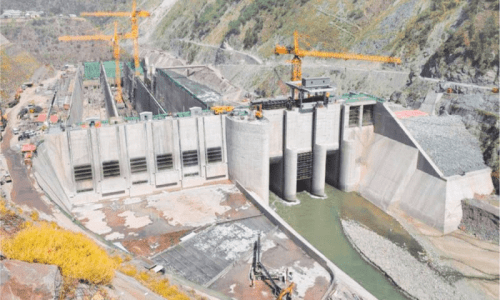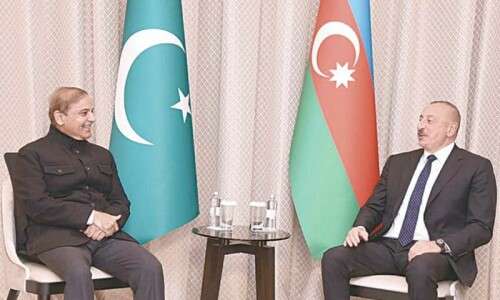Introduction
The Neelum-Jhelum Hydropower Project (NJHP), a significant venture aimed at providing cost-effective and environmentally friendly electricity, has been plagued by repeated faults, leading to potential legal action against the project’s consultants. The project, which is valued at Rs500 billion, has faced numerous setbacks, particularly in its head race tunnel, depriving Pakistan of much-needed power supply.
Prime Minister Shehbaz Sharif is set to make a final decision regarding the legal action in consultation with relevant stakeholders. A special committee formed to investigate the issue has also suggested expanding the investigation to contractors involved in the project.
Background of Neelum-Jhelum Hydropower Project
The Neelum-Jhelum Hydropower Project is a 969-megawatt power project located near Muzaffarabad, the capital of Azad Kashmir. It is a key infrastructure initiative aimed at generating power through a sustainable and eco-friendly approach. However, despite being an important asset for the country, the project has faced significant operational issues that have delayed its completion and raised concerns about the effectiveness of its management.
The project’s consultants, a joint venture called Neelum-Jhelum Consultants, consist of MWH USA (the lead firm), NORPLAN from Norway, and Pakistan’s NESPAK, ACE, and NDC. Meanwhile, the contractors responsible for the project’s execution are a consortium of two Chinese companies — CGGC and CMEC.
Faults Identified in the Head Race Tunnel
A major issue facing the Neelum-Jhelum Hydropower Project is the series of faults that have emerged in the head race tunnel. The tunnel, a crucial component of the hydropower system, has experienced cracks, leading to operational delays and raising questions about the project’s management.
The investigation into these faults has identified the consultants’ role in the failure of the project. The committee investigating the matter has pointed to poor oversight and insufficient quality control, which led to the cracks and delays. Given the critical nature of the problem, the government is considering legal action against the consultants.
Prime Minister’s Involvement in the Decision-Making Process
Prime Minister Shehbaz Sharif has been actively involved in monitoring the progress of the investigation and the decision-making process. The Prime Minister is consulting with key stakeholders, including the Ministry of Water Resources, the Planning Commission, and legal advisors, to determine the best course of action.
A special committee, chaired by the Minister for Planning and Development Ahsan Iqbal, has been set up to assess the situation. The committee is tasked with formulating recommendations for immediate remedial measures to rehabilitate and operationalize the project. This includes exploring legal options to hold the consultants accountable for the ongoing faults and delays.
Legal Issues and Potential Lawsuit
The investigation has led to the identification of sufficient grounds for suing the consultants. Legal experts have discussed the potential for filing a lawsuit against the consulting firms involved, but there are concerns about the implications of such a decision. The lead firm in the joint venture, MWH USA, is based in the United States, and legal experts have advised caution to avoid any international legal complications.
During a recent meeting, Minister Ahsan Iqbal discussed the legal aspects with the Secretary for Law and Justice and the Attorney General of Pakistan (AGP). The objective was to ensure that the legal basis for any potential lawsuit would be solid and defensible in court. The committee emphasized the importance of a thorough internal accountability process and the need to hold those responsible for the failure of the project accountable.
International Experts’ Role in the Investigation
Given the international nature of the consultants involved, the meeting participants suggested that an independent review by international experts could provide an objective perspective on the situation. This would also help authenticate the findings of the investigation before taking any legal action against the consultants.
Minister Ahsan Iqbal supported the idea of engaging international consultants to provide an unbiased evaluation of the situation. He stressed the need for both consultants and contractors to have the opportunity to present their defense and clarify their positions before any decisions were made.
Contractor’s Role in the Project’s Problems
In addition to the consultants, the investigation has also raised questions about the contractors’ role in the project’s failure. The consortium of two Chinese firms — CGGC and CMEC — is responsible for executing the project’s construction, but the faults in the tunnel and delays in the project’s completion have led to concerns over their performance as well.
The committee has suggested expanding the scope of the investigation to include the contractors, as their involvement in the project’s problems cannot be overlooked. Minister Iqbal agreed that an independent review of the contractors’ performance should be carried out to determine the extent of their responsibility in the project’s failure.
Accountability and Internal Oversight
Minister Ahsan Iqbal expressed frustration over the lack of accountability mechanisms in place from the start of the project. He stated that an effective monitoring system should have been established to track the progress of the project and assign clear responsibilities for its success or failure.
The delay in the completion of the final investigation report has also hindered timely accountability. Iqbal emphasized that swift action should have been taken much earlier to address the issues, as the project’s delay has cost the nation a significant amount of money and resources.
Conclusion and Next Steps
The Neelum-Jhelum Hydropower Project, despite being a vital energy project for Pakistan, is currently in limbo due to repeated faults and delays. The government is actively investigating the causes of these problems and is considering legal action against the consultants involved. The investigation is also looking into the role of the contractors, with the aim of identifying those responsible for the project’s failure.
Prime Minister Shehbaz Sharif is expected to make a final decision on the matter in the coming weeks, with the involvement of legal experts and international consultants to ensure a fair and objective evaluation of the situation. The government is committed to resolving the issues and getting the project back on track as quickly as possible.
FAQs
1. What is the Neelum-Jhelum Hydropower Project?
The Neelum-Jhelum Hydropower Project is a 969-megawatt power generation project located near Muzaffarabad, Azad Kashmir. It is designed to provide an eco-friendly and cost-effective source of electricity for Pakistan.
2. What is the issue with the Neelum-Jhelum Hydropower Project?
The project has experienced faults, particularly in its head race tunnel, leading to operational delays and concerns over the consultants’ and contractors’ roles in the project’s failure.
3. Who are the consultants involved in the project?
The consultants for the project are a joint venture consisting of MWH USA (lead firm), NORPLAN (Norway), and Pakistan’s NESPAK, ACE, and NDC.
4. Why is the government considering suing the consultants?
The government is considering suing the consultants due to their role in the repeated faults and failures of the project. An investigation has found sufficient grounds for legal action.
5. What are the next steps for the Neelum-Jhelum Hydropower Project?
The government is working on immediate remedial measures to operationalize the project. This includes further investigation into the consultants’ and contractors’ roles and legal action if necessary
SEE ALSO:



